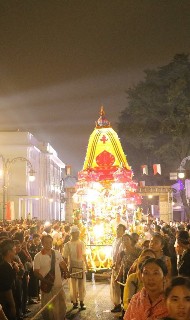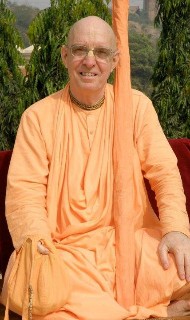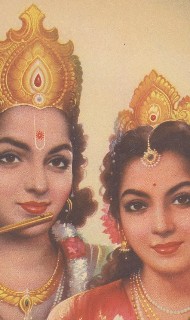 We welcome you to this most auspicious place, the temple of Sri Sri Radha-Radhanath, on the most auspicious occasion of the beginning of Kartik, in the most auspicious association of Lord Krishna’s devotees. Kartik is also known as the month of Damodara (dama means “ropes,” and udara means “abdomen”), Krishna who allowed Himself to be bound about the waist by the ropes of His devotee’s love.
We welcome you to this most auspicious place, the temple of Sri Sri Radha-Radhanath, on the most auspicious occasion of the beginning of Kartik, in the most auspicious association of Lord Krishna’s devotees. Kartik is also known as the month of Damodara (dama means “ropes,” and udara means “abdomen”), Krishna who allowed Himself to be bound about the waist by the ropes of His devotee’s love.
Srila Rupa Gosvami compiled the law book of Krishna consciousness, the science of devotion, in the Bhakti-rasamrta-sindhu, translated by Srila Prabhupada in a summary study as The Nectar of Devotion. There the observance of Kartik is mentioned as one of the sixty-four items of devotional service. Rupa Gosvami quotes from the Padma Purana that just as Lord Damodara is favorably inclined toward His devotees, so the month of Kartik, which is also dear to Him, bestows great favor upon them, even for a little service or a little practice. It is even said that the benefit gained for service performed in the last five days of Kartik is equal to that gained from service performed for the entire month. In other words, for a very small performance of devotional service in the month of Damodara, one gets a very big result—especially in Vrindavan. Also, Srila Prabhupada has explained that wherever the Deities of Radha and Krishna are installed, that is also Vrindavan. So, even here our devotional service will be magnified “one thousand times.”
Srila Prabhupada gives us the example of a store that has a sale, when a customer can get a very valuable item for a very low price. So, the month of Kartik is like a sale, a transcendental sale. By a little investment in terms of spiritual practice and service, you can get a great benefit. Of course, the management of the store hopes that you will come to appreciate its goods and patronize the store even after the sale is over. So we too hope that you will continue with your spiritual practices, or your increased practices, even after the month of Kartik.
There is a special potency to the month itself. Just as certain times of the day, such as the brahma-muhurta, which begins one hour and thirty-two minutes before sunrise and continues until the sun rises, are more auspicious for spiritual progress and enhance the value of one’s practices, so too, within the year, the month of Kartik is most auspicious. Devotees try to take advantage of the facility offered by Kartik by on the one side increasing their spiritual practices and doing extra service—they chant more rounds, read more scripture, recite more prayers, distribute more books, and make special offerings—and on the other side decreasing their material involvement, their sense gratification. As it is, we are in the four-month period of Caturmasya, so every month we forgo a certain type of food, but in Kartik devotees may do extra austerities. They may eat only once a day, or give up sweet or fried foods, or rise earlier than usual, or whatever—work on some area of their spiritual life that they want to improve—and they get special mercy in the month of Kartik to fulfil their vows and improve their spiritual practices.
Today also is sarat-purnima, the full-moon night of the sarat season, the night on which Krishna played upon His transcendental flute at Vamsivata by the Yamuna River in Vrindavan and called the gopis to dance with Him. Now, we may take it that He played on His flute and in a figurative way called the gopis to dance with Him, but actually Krishna’s flute is one of His messengers, and so the gopis not only heard the beautiful, melodious sound of the flute but also received the message that Krishna wanted to meet them. And because their only desire was to please Krishna, to fulfil His desires and make Him happy, they all went to Him—not with the aim of fulfilling any selfish desire of their own, but with the sole aim of fulfilling Krishna’s transcendental desire to dance with them.
Because the rasa dance superficially resembles the dancing of men and women in the material world, it can easily be misunderstood, and there are critics of Lord Krishna and Srimad-Bhagavatam and Krishna consciousness itself that find fault with the rasa-lila. I know religious groups outside of the Vedic tradition who criticize and challenge, “Oh, Krishna is a womanizer. How can you worship a god who enjoys with women?” They do not understand the pure love exchanged by Krishna and the gopis. In Sri Caitanya-caritamrta, Srila Krsnadasa Kaviraja Gosvami explains the difference between love, or prema, and lust, or kama. In lust, the person wants to gratify his or her own senses, whereas in pure love, the devotee wishes to satisfy Krishna’s transcendental senses. The two may resemble each other, but actually they are completely different.
kama, prema,—donhakara vibhinna laksana
lauha ara hema yaiche svarupe vilaksana
atmendriya-priti-vancha—tare bali ‘kama’
krsnendriya-priti-iccha dhare ‘prema’ nama
“Lust and love have different characteristics, just as iron and gold have different natures. The desire to gratify one’s own senses is kama, but the desire to please the senses of Lord Krsna is prema.” (Cc Adi 4. 164–165) Iron and gold are both metals, but there is a great difference between them in their value. The pure love of the devotees for Krishna is like gold, and the lust of people in the material world who want to gratify their senses is like iron.
Another point of contention related to the Tenth Canto of Srimad-Bhagavatam is that the name of Radha is not mentioned. Some people challenge, “You are worshiping Radha and Krishna, Radha-Radhanatha, but on what authority? We don’t find the name of Radha in the Bhagavad-gita or Srimad-Bhagavatam.” But in the five chapters that describe the rasa-lila, we find that after Krishna called the gopis and began to reciprocate with them, He disappeared. The gopis were then plunged into separation from Krishna, and they began to search all over the Vrindavan forest for Him. In time, they found two pairs of footprints: Krishna’s and a gopi’s. Then the other gopis, in their separation, exclaimed:
anayaradhito nunam
bhagavan harir isvarah
yan no vihaya govindah
prito yam anayad rahah
“Certainly this particular gopi has perfectly worshiped the all-powerful Personality of Godhead. Therefore Govinda was so pleased with Her that He abandoned the rest of us and brought Her to a secluded place.” (SB 10.30.28) “Because She worshiped Lord Hari better than all of us, She has gotten to be with Krishna now.” The word aradhito, which means “worshiped” or “perfectly worshiped,” refers to Radha, as confirmed by Srila Visvanatha Cakravarti Thakura and other acharyas. They explain that Her name does appear in the Vedas, Upanisads, and other Puranas, and that in this verse, although Her name is not mentioned explicitly, the superexcellent glories of Sri Radha are nonetheless proclaimed.
Ultimately, Krishna also left Srimati Radharani, and when the other gopis came upon Her, they found Her in such a state of intense lamentation in separation that they felt, “Actually, She loves Krishna more.” There is a technical discussion of what actually took place in the rasa-lila, why Krishna left with Radharani and why eventually He left Her too. But His ultimate purpose was to reunite all the gopis, and when the other gopis saw Srimati Radharani in such a state of ecstasy in separation, they felt sympathetic toward Her. They did not feel any envy at all.
So, they all searched for Krishna together. But they could not find Him anywhere. Finally they decided, “We cannot find Krishna unless He wishes to be found. We cannot force Him to come before us.” They considered, “How can we attract Krishna’s attention? How can we move Krishna to come back to us?” And they concluded that the best method was sankirtana, chanting the glories of Krishna together, along with crying.
So, they returned to the bank of the Yamuna where they had originally met Him and began to sing the glories of Krishna—beautiful songs in separation, known as the Gopi-gita. And when Krishna heard the loving prayers of the gopis, their sankirtana, His heart was moved and He could no longer stay away from them. He came and reappeared before them in His most attractive feature:
tasam avirabhuc chaurih
smayamana-mukhambujah
pitambara-dharah sragvi
saksan manmatha-manmathah
“Then Lord Krsna, a smile on His lotus face, appeared before the gopis. Wearing a garland and a yellow garment, He directly appeared as one who can bewilder the mind of Cupid, who himself bewilders the minds of ordinary people.” (SB 10.32.2)
Then followed a very interesting dialogue between Krishna and the gopis. The gopis felt some transcendental anger because Krishna had abandoned them. After all, He had called them to Him, they had risked everything to go to Him in the dead of night, and then He had left them. So they wanted Krishna to explain why.
In a most tactful and intelligent way, they began, “There are three kinds of lovers.” They presented three categories of lovers, or different ways that lovers deal with others, and asked Krishna to explain them. Indirectly, they were asking Krishna, “In which category do you fit?”
In one category are people who reciprocate exactly with the other party. In other words, “If you are kind to me, I will be kind to you; if you ignore me, I will ignore you.” Krishna said, “They are like merchants. They give only with the expectation of return, and they give only as much as they expect in return. Actually, they are selfish.”
In the next category are those who love the other even though the other does not love them. For example, at least in principle, parents love their children no matter what the children do. The children may not even appreciate the parents’ service, but the parents go on loving and serving them. And even better than parents are devotees, because although parents serve their own children, devotees love and serve everyone. Whether others appreciate them or not, they try to help everyone. Krishna said, “Those who love others even if others don’t love them in return, they are following the true path of dharma and they are the true friends of humanity.”
In the third category are those who don’t reciprocate even when others love them. The first category is “I reciprocate only if you love me.” The second category is “Even if you don’t love me, I love you.” And the third category is “Even if you love me, I don’t reciprocate.” So, the gopis wanted Krishna to admit that He was in the third category. They did not want to say it themselves; they wanted to hear it from Krishna’s own mouth. They wanted to trap Him with their subtle network of wise and clever words.
Now, within the third category there are four divisions. There is the atmarama: He is completely self-satisfied. Even if you love him, he won’t reciprocate, because he is self-satisfied; he is situated in transcendental bliss. Then there is the apta-kama: He has desires, but they are already satisfied, so he doesn’t need you. Even if you love him, he won’t reciprocate. Then there is the third division, akrta-jna: he is ungrateful. And then there is the last division, guru-druhah. In the first three, “You love me, but I don’t reciprocate; I remain indifferent,” but in this last category, guru-druhah, “You love me, and I am not just indifferent to you; I become inimical.” Actually, the gopis wanted Krishna to admit that He had been ungrateful.
Finally, Krishna had to respond to their question, and His answer was, “I did not neglect you, nor was I indifferent to you. I was always thinking of you. But in order to increase your love for Me, I hid Myself from you.” Krishna gave the example of a poor man who gains some wealth and then loses it. He will be so anxious that he can think of nothing except his lost treasure: “What happened to my money? How can I get it back?” Krishna said, “So I was reciprocating with you, because your desire was to increase your love for Me, and by hiding Myself from you I created a situation by which your attachment for Me would increase. So I was reciprocating with you.” Although Krishna’s argument sounded good, it did contain one defect: the gopis’ love was already unlimited, and even so, by its very nature it was always increasing. So that could not have been the real reason.
Again, there is an intricate and elaborate discussion by the acharyas about the dialogue between Krishna and the gopis, but at the very end Krishna admits defeat. He says,
na paraye ’ham niravadya-samyujam
sva-sadhu-krtyam vibudhayusapi vah
ya mabhajan durjara-geha-srnkhalah
samvrscya tad vah pratiyatu sadhuna
“Actually, I am unable to repay My debt for your service to Me even with the prolonged life of Brahma, because you have given up everything for Me. You have given up family ties, which are so difficult to break. You have given up the dictates of the world, of the Vedas, and of your relatives. You have forsaken everything for My sake—which I could not do for you. You have given up all other relationships for Me, but I could not do that for you. I still have My father and mother and friends. You came running out of your houses in the middle of the night, but I sneak out and return in the morning so that no one catches Me. But you, with complete abandon, have come to meet Me without any consideration of the consequences. And I have so many devotees with whom I reciprocate: devotees in madhurya-rasa, in vatsalya-rasa, in sakhya-rasa, in dasya-rasa, and in santa-rasa. I also reciprocate with the sadhakas in the material world who are struggling and trying to become devotees. I reciprocate with everyone who approaches Me. But you love only Me. So I cannot equal your love. I admit it: I can never repay My debt to you.” He concluded, “I am defeated by your love.”
The gopis were so touched by Krishna’s words that they thought, “Now He has defeated us! We could not admit to Him that He defeated us, but He has admitted to us that we defeated Him. So He has defeated us!” Of course, this is all on the platform of transcendental love. And it is said that later, when Krishna left Vrindavan to go to Mathura and Dvaraka and the gopis were left in separation from Him, they would think of His words to them, na paraye ’ham, and that would give them solace to bear the separation. Of course, here we come to another subtle and intricate discussion, because even in separation from Krishna they experienced His presence.
After hearing Krishna’s reply, the gopis were appeased, and so He began the pastime of the rasa dance. All of the gopis were dancing in a circle, and Krishna expanded Himself to be next to each one. Each gopi felt, “Krishna is with me alone,” and each was completely satisfied by Krishna.
One of our godbrothers, Garuda dasa Adhikari (Graham M. Schweig), is a professor at a university in the United States, and he has written a translation and study of the rasa-panca-adhyaya, the five chapters in the Tenth Canto of Srimad-Bhagavatam that describe Sri Krishna’s pastimes of the rasa dance, which has been published by Princeton University Press. He uses the image of the rasa dance as a symbol for interfaith harmony. It is a symbol that is most appropriate, especially for a diverse country such as South Africa.
The idea is that there were so many gopis, and each was individual, but that Krishna was by the side of each one, reciprocating with each perfectly. He accepted all of them, and they all accepted one another, and there was complete harmony—not only between Krishna and the gopis but also among the gopis themselves—in this dance of divine love. So, different worshipers serve God in different ways. They have different practices and rituals, and different scriptures and languages. But God reciprocates with all of them. And if they can come into harmony, not only with God but also with one another, in the dance of divine love, then there can be complete harmony in the world.
So, today is a most sacred occasion: the beginning of Kartik-vrata, and sarat-purnima, the night Krishna enjoyed His rasa-lila with the gopis—after removing Himself from their presence in order to demonstrate to the world, in their separation from Him, their supreme love.
Thank you very much.
Hare Krishna.
[A talk by Giriraj Swami, October 17, 2005, Sri Sri Radha-Radhanath Temple, Durban, South Africa]

 By Nila Kamala
By Nila Kamala
 Kendari is the capital of the Indonesian province of Southeast Sulawesi. The city lies along Kendari Bay. The festivities for the Ratha Yatra were arranged at the district football ground of Ladongi in Loea District. Devotees started to arrive a day ahead of the festival especially devotees from Amongedo district. Saciputra Das and Ramanuja das from Bali arrived at Jati Bali, 3 hours’ drive from Ladongi, with 30 kilos of flowers for decorating the chariot. Bhakta Gede Sukanta and his wife kindly arrange to receive the devotees at their residence where we had kirtan, class and, of course, prasad. Since we had to start very early the next morning seeing the constraint on time all devotees worked together to prepare the garlands throughout the night.
Kendari is the capital of the Indonesian province of Southeast Sulawesi. The city lies along Kendari Bay. The festivities for the Ratha Yatra were arranged at the district football ground of Ladongi in Loea District. Devotees started to arrive a day ahead of the festival especially devotees from Amongedo district. Saciputra Das and Ramanuja das from Bali arrived at Jati Bali, 3 hours’ drive from Ladongi, with 30 kilos of flowers for decorating the chariot. Bhakta Gede Sukanta and his wife kindly arrange to receive the devotees at their residence where we had kirtan, class and, of course, prasad. Since we had to start very early the next morning seeing the constraint on time all devotees worked together to prepare the garlands throughout the night.


 By Keshava Bharati Das Goswami
By Keshava Bharati Das Goswami


 By Gauranga Darshan Das
By Gauranga Darshan Das By Mathura Lilesvari Devi dasi
By Mathura Lilesvari Devi dasi












